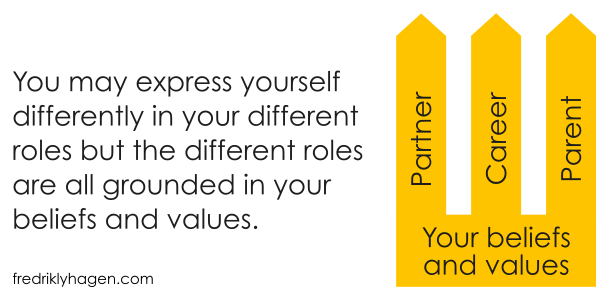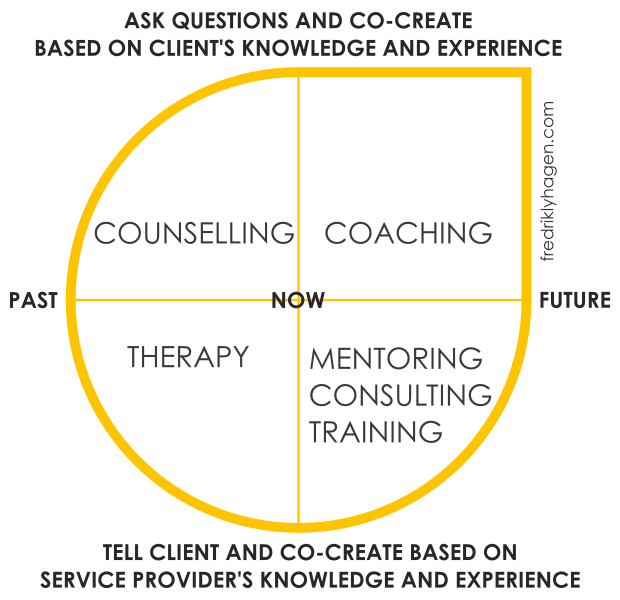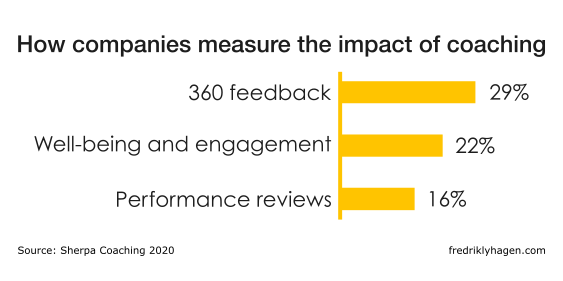This article will help you understand:
1. WHAT IS COACHING
What it is and what it is not, the difference between coaching and mentoring, an insight into the weird and wonderful world of “internet coaches”, and more.
2. HOW YOU CAN BENEFIT FROM COACHING
I’ll explain the main reasons executives and companies hire coaches, and what the main benefits are according to coachees.
3. HOW TO MEASURE THE IMPACT OF COACHING
It’s difficult to put a monetary value on investment on coaching. Therefore, according to surveys, most companies use qualitative indicators to measure impact. This section will ask a few critical questions and share the most common methods.
4. TIPS FOR HIRING A COACH
These days, everyone seems to be calling themselves a coach, making it rather tricky to pick a good one. This section will walk you through the key selection criteria for hiring a coach.
I wanted to write article this to help clear up the confusion around coaching, because it’s a jungle out there. Yet there are many great coaches that can help you unleash your full potential in life and leadership.
First, the word coach… What does the word evoke in you?
I don’t really like the word “coach” because it’s used in so many contexts, and so many people are calling themselves coaches, without proper training, experience or an ethical foundation for their work. The word “coach” is a diluted term so let us distill the practice of coaching to what honours the potency of skilful coaching.
In this article, I focus on executive coaching but most of what I say applies to life coaching as well. I’ll use the terms “coach” and “coaching” for both executive and life coaching.
WHAT IS COACHING?
A professional coach is a master of the process of cognitive self-development, is focused on the here and now, and is a catalyst for reflection and change.
A definition from the International Coach Federation: “Coaching is partnering with clients in a thought-provoking and creative process that inspires them to maximise their personal and professional potential.”
In his inspiring book “The War of Art” Steven Pressfield writes: “Most of us have two lives. The life we live, and the unlived life within us. Between the two stands Resistance.”
A professional coach will help you explore and deal with this resistance.
Working with a professional coach you co-create a “safe space” within which you can explore your challenges, limiting beliefs, values, attitudes, assumptions and aspirations, in complete honesty and without fear of judgement.
The professional coach is trained to support you on this exploratory inner journey. He/she will NOT provide answers or advice but discern, probe, and nudge you forward in discovering your own answers and create clarity. When you’ve reached a higher level of clarity the professional coach will challenge you to co-create a plan to go from insight to action and bring about change.
This approach applies to all types of coaching. Whether it’s life coaching, executive coaching, relationship coaching or another form, the coach’s role is to ask the hard, intrinsic questions.
This also means that all forms of coaching should take a holistic view of the coachee’s life.
You may hire an executive coach to address professional challenges or a relationship coach to address challenges in the relationship, but both your professional role and your role as partner stand on the same deep foundation – which is YOU.

According to a survey by Harvard Business Review [1], 97% of executive coaches are hired to support professional development but 94% of them say that over time the conversations shift to the bigger issues like life purpose, work-life balance, and how to lead from within.
See more on the benefits of working with an executive coach below.
WHAT IT IS NOT
Surprised I have to write this but coaching is not a pink unicorn that aligns your chakras. Nor will coaching make the car of your dreams magically appear on your driveway if you manifest it daily.
If we leave the woo-woo aspect of “coaching” aside, in my experience, the most confusion around the professional coach’s role is how much subject matter expertise a professional coach should have in the client’s domain.
People often confuse professional coaching with mentoring.
There is a distinct difference between coaching and mentoring, and while your coach may move seamlessly between the two, it’s important for the coach and coachee to be clear about the difference, and when it’s appropriate to lead with coaching versus leading with mentoring.
A mentor is a subject matter expert who in the role of a trusted advisor shares his/her experience with the client. A mentor has typically lived through the mentee’s situation and can share his/her wisdom as a trusted advisor. The benefit of have a mentor is that you may be able to take shortcuts by reflecting on or adopting your mentor’s advice.
However, be careful to not avoid the hard questions and answers that you should explore yourself. As with many things in life, it can be tempting to focus on the easy answers and move forward quickly, instead of making the extra effort to find your own answers.
Maybe you need a mentor instead of an executive coach?
If your primary reason for hiring support is enhancing your skills in your professional field, rather than cognitive exploration and development, a mentor can be very valuable to help you plan your route, guide the way, help you avoid the pitfalls, and cheer you on when the going gets tough.
Not ready to move forward until you’ve sorted out issues from your childhood?
Another common misconception is that coaching is similar to counselling or therapy. Like I said before, coaching is focused on the present and the path to the future and will only address past issues if it’s relevant for helping you move forward in the here and now. If you need to untangle issues on the path from the past to the present, you’re better of seeing a therapist rather than a coach.
Just want to get the job done? Hire a consultant.
The distinction between coaching and consulting generally well understood, but just to be clear: A consultant is hired to come with the right answers, a coach is hired to come with right questions.
The weird and wonderful world of “internet coaches”?
In the weird and wonderful world of internet I see a lot of “coaches” making bold extrinsic promises like the business coach who will help you build a six-figure income in one month as you work from home (along with many other, occasionally more realistic and credible pitches).
These people often call themselves business coach, performance coach, marketing coach, etc., and while their intentions may be honest, their approach is often far from coaching.
From what I’ve seen they typically don’t seek “partnering with clients in a thought-provoking and creative process that inspires them to maximise their personal and professional potential.” Rather, such “coaches” seek to provide answers based on a blueprint model with defined steps based on their own experience (and sometimes success) in their specialisation.
As you can see from below illustration what they do is in the quadrant of mentoring and consulting, not coaching.

This may seem like semantic differences, but each title (coach, mentor, consultant, etc.) is associated with very different expectations from a reasonably informed client, and very different methodologies by a skilled service provider.
So, if the service provider is unclear about the terminology, it’s of critical importance to do your due diligence and clarify expectations about the relationship. Is the service really coaching? Or is it mentoring, consulting, training, or a hybrid? All of these can provide tremendous value if you have the right expectations and apply it to the right situation.
The bottom-line: it’s critical to understand what is offered and clarify expectations.
Share this Post
HOW AN EXECUTIVE COACH CAN BENEFIT YOU
The essence of coaching is to help a client to clarify and calibrate their inner compass, and take steps towards living more true to themselves.
In executive coaching, we direct our attention to professional performance but very often the root cause of the issues we uncover are insecurities about how to tackle life, inside and outside the work environment.

Difficulty handling change

Not working well in a team

Poor interpersonal relationships
All of these directly point back to the executive’s ability to handle his/her own emotional state and meaning-making capacity.
Leading business performance is not about what you know but about how you relate to others, and a relationship is determined by the quality of the conversations you have. High quality conversations emerge from a foundation of trust, which is the product of intent, authenticity and competence, and to nurture these qualities you need space for self-reflection.
At the same time, we are in a perpetual state of catching up. Catching up on macro trends, technological advancement, the competitive landscape, organisational performance and with family and friends. Therefore, seemingly fanciful notions like self-reflection may be pushed down the priority list, week after week, month after month.
The truth is though that self-reflection holds the key to business performance and personal fulfilment because great leadership is personal and requires you to be able to lead yourself first.
However, coaching isn’t enough and doesn’t create change in itself. Coaching can clear your mental fog, create new perspectives and open up the landscape of possibilities, but you must then take action to create change.
Surveys show that the success of coaching is tightly linked to the attitudes of the coachee. Coachees who demonstrate curiosity, a willingness to learn, and take action in life in general are also those reporting the highest level of satisfaction from working with a coach.
Would Serena Williams and Michael Phelps be world-class athletes without coaches? No. They and most other world-class athletes have multiple coaches, at least two: one coach for developing their technique in their specific sport and one to help them with their mental game.
If you want to perform at your full potential in life and business doesn’t it make sense to have sparring partner to help you master your mental game and navigate the choices you’re faced with?
MEASURING THE IMPACT OF COACHING

What is the cost of executive burn-out?

What is the cost of a dysfunctional management team?

What is the cost of lost opportunities because the executive doesn’t take time to reflect, dare to be challenged, nurture talent and look towards the future?
It’s difficult to quantify increased motivation levels, greater creativity and innovation, more effective teams, and the other ingredients of a successful and effective leader in financial terms.
Sure, you can measure increase in revenue after coaching the sales leader. But is the revenue increase because of the coaching, or because of less sick days in the team, or market forces, or something else?
Most companies use soft indicators to measure the impact of coaching
A common method for evaluating the effectiveness of coaching is to perform a 360-evaluation or a self-assessment, or both, at the beginning of the coaching relationship and do the same at the end, or after sufficient time for behavioural change to be experienced, to get a qualitative indicator of the return of investment.
According to Sherpa Coaching’s 15th Annual Executive Coaching Survey[3], the three most popular ways of measuring the impact on coaching are 360 feedback, well-being and engagement, and performance reviews.

[3] https://www.sherpacoaching.com/annual-executive-coaching-survey/
TWO TIPS FOR HIRING A COACH
To make it easy and practical for you, there are two things you need to consider when hiring a coach: experience and personality, and in that order.
A successful coaching relationship requires personal chemistry but can’t replace experience so start evaluating that and for those that pass that needle’s eye it’s about personal chemistry.
How to evaluate a coach’s experience?
Evaluating experience of an executive coach means looking at two things: (a) coaching experience and (b) relatable experience.
Coaching experience is about repeatedly getting sustainable results, which in practical terms means that the coaching approach is underpinned by a clear methodology.
An accreditation from a reputable professional coach association will ensure the coach is trained on and experienced in coaching methodology. However, this doesn’t a guarantee that the coach is good. There are great coaches without accreditation – and there are accredited coaches who are everything but good.
However, due to the plethora of coaches, many companies do require a coach accreditation from a well-established and reputable professional coach association.
The International Coach Federation (ICF) is the largest professional coach association in the world and de facto sets the standard for coaching ethics, methodology and education in coaching.
By narrowing your search to ICF-accredited coaches you’ll ensure that your shortlisted candidates have a thorough understanding and experience of professional coaching because even the entry-level accreditation requires significant study and client coaching experience, irrespective of seniority and other experience.
Relatable experience is about enabling rapport and trust to create a “safe space” for effective coaching. This doesn’t mean an executive coach should have done the executive clients job before but should have worked in a similar setting. Maybe different industry, different domain and different culture but can relate to the systemic, cultural and political challenges the executive faces.
Personal chemistry is critical for a rewarding coaching relationship
This is more important than coaching qualifications but make sure that your shortlisted candidates understand and practice professional coaching.
The previously mentioned survey by HBR also asked what they look for when hiring an executive coach and the top two criteria (with a clear gap to the third and the rest) in order of importance are:

Experience from coaching in a similar setting

Clear methodology
Personal chemistry is more important than formal coaching qualifications, but make sure that your shortlisted candidates understand and practice professional coaching.
A coaching relationship requires a “safe space”. A mental space that allows for comfortable sharing of what really goes on in the client’s heart and mind. Since coaching is about finding your own answers, a client must explore the undercurrents of his/her mind, and reflect, be encouraged and challenged, to reach new insights.
This can only happen in coaching relationship if there’s mutual respect and both the coach and client feel they can speak freely and be candid.
The best way to find out if there’s personal chemistry is simply to meet with a couple of the shortlisted coaches and see if you click.
A good thought experiment is to think if you'd have enough to talk about be comfortable spending a few hours alone in the car with the coach. If your answer is Yes, you probably have the foundation for building a rewarding coaching relationship.
In summary
I wanted to write article this to help clear up the confusion around coaching – because it’s a jungle out there. Yet there are many great coaches that help you create magic!
To reiterate the key points.

Executive coaching is key to sustainable business performance and personal fulfilment.

When looking to hire a coach, make the long-list based on accredited coaches (I recommend ICF), then a shortlist based on experience and methodology, and finally meet a couple of coaches to evaluate personal chemistry.

Rather than focusing on ROI, ask yourself what’s the cost of not supporting your executive, and then measure impact with 360 feedback (in my experience the Leadership Circle Profile is by far the best tool for this).
Share this Post


